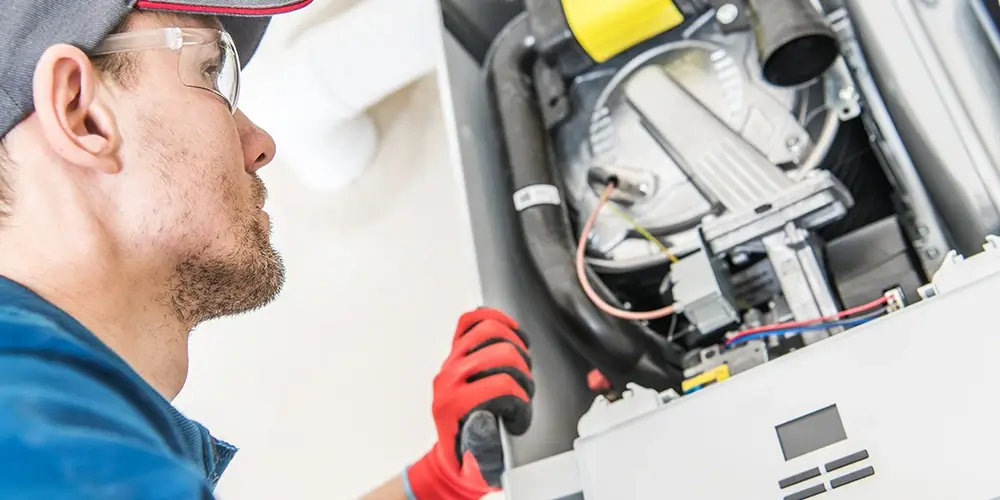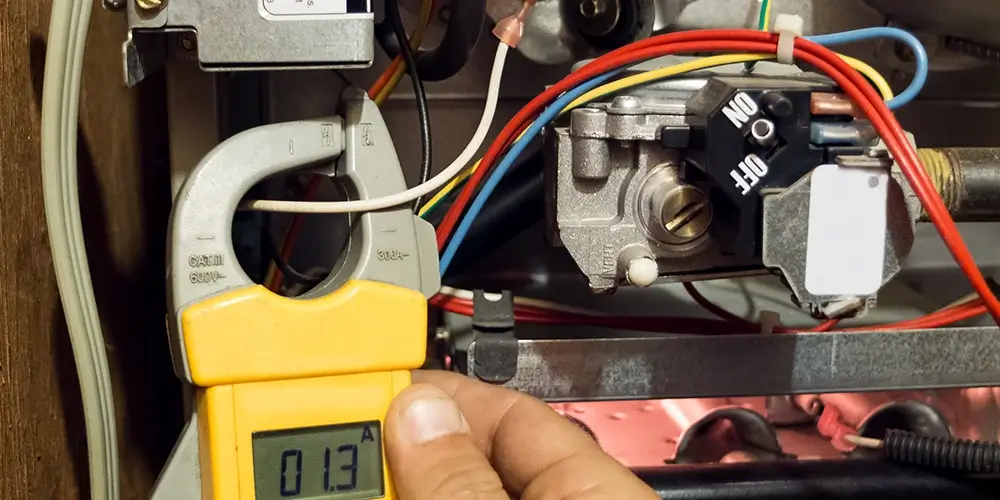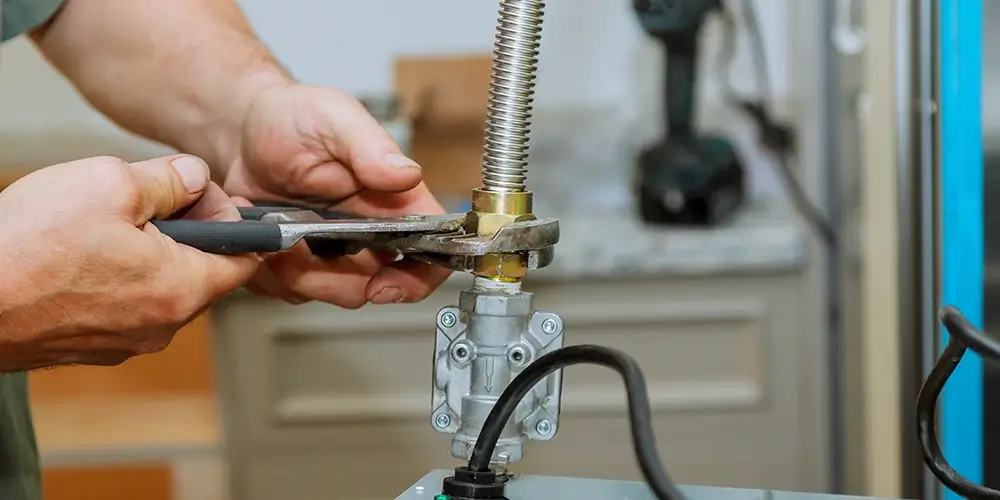Heating & Furnace Repair & Replacement

No Furnace Lasts Forever
Modern furnaces are complex machines. Moving parts wear out. Delicate electronics can break down. Over time, even the best furnace will need repair.
A well-maintained heater may last 20 years.
A poorly maintained gas or electric furnace is downright dangerous. Gas leaks can be deadly. Electric furnaces can short, overheat, and cause fires.
So, if your furnace is on the fritz, it’s time to call in the pros. Furnace installation and repair should never be a DIY project or even a job for most handymen.
We Specialize in Heating, Cooling & Appliances
Only a licensed, professional technician should be trusted with modern furnaces and HVAC systems that may be attached to gas lines, contain complex electronics and electrical wiring, and often require ductwork.
At West Coast Chief, we specialize in heating and cooling — air conditioners, furnaces, and HVAC systems. We know every brand and appliance model sold in the Los Angeles area. If your furnace is misbehaving, we’ll give it the proper dose of discipline.
We service all furnace types and brands, including:
- Natural gas furnaces
- Electric furnaces
- Propane furnaces
- Gravity furnaces
- Boilers
We service most other heating systems, too, including:
- Ductless mini splits
- Radiant heating
- Wall heaters
- Heat pumps

Signs Your Furnace Needs Repair
Here are some reasons to call us:
- Your furnace fails to generate heat or doesn’t turn on.
- Your furnace runs much longer than usual.
- The furnace shuts off prematurely.
- The furnace cycles on and off too frequently.
- The furnace makes strange noises.
- The pilot light keeps going out (gas furnaces only).
- There’s no hot air coming from the vents.
- Your thermostat isn’t working correctly.
- You see rust around the furnace or ductwork.
- Your energy bills keep rising for no apparent reason.
- You smell unpleasant odors near the furnace or from the vents.
Learn to recognize warning signs. When a professional heating technician inspects your furnace, minor problems can be resolved before they seriously damage your heating system.
When your heating costs spike, your furnace is asking for help and attention.
Common Furnace Repairs
Furnace repair is a job for certified technicians and not a do-it-yourself project! Many repairs require a license to work with natural gas and electricity.
The repairs we perform most often include:
- Replacing furnace filters
- Cleaning furnace parts
- Repairing or replacing the blower motor
- Repairing or replacing the igniter
- Checking and repairing the flue pipe
- Repairing or replacing the heat exchanger
- Tightening electrical connections
- Lubricating moving parts
- Inspecting and replacing furnace belts
- Fixing leaks in the furnace
- Inspecting and cleaning the furnace ignition system (gas furnaces only)
- Calibrating thermostats
- Repairing or replacing ductwork
For electric furnaces, we also:
- Repair or replace heating elements
- Clean and repair fans

Maintenance Extends Furnace Life
Scheduled tune-ups can prolong the life of your furnace, improve its efficiency, and prevent minor problems from turning into major ones.
Most furnace manufacturers recommend an annual furnace tune-up.
At West Coast Chief, we offer furnace maintenance plans that make it easy and affordable to keep your furnace in tip-top shape. Our furnace tune-up includes:
- Inspecting and cleaning the furnace combustion chamber (gas furnaces only)
- Inspecting and cleaning the furnace heat exchanger
- Inspecting burners (gas furnaces only)
- Checking for carbon monoxide leaks (gas furnaces only)
- Lubricating moving parts
- Tightening electrical connections
- Repairing minor issues
- Calibrating thermostats
Furnace Replacement vs. Repair
No furnace lasts forever, not even the most reliable brands. At some point, replacement is the best option.
Here are some clues that it might be time to replace your old friend:
- Your furnace is more than 10 years old.
- The repair cost is almost as much as a new furnace.
- Your furnace breaks down often.
- Your furnace generates insufficient heat, even after repair.
- Your furnace costs too much to operate.
- You’re considering an upgrade to a more efficient unit.
Repairs may be covered if your furnace is less than 10 years old and still under warranty. Otherwise, an older furnace will always be less efficient than a new furnace, driving up heating bills.
Furnace Efficiency & Ratings (AFUE)
A furnace with a higher AFUE (annual fuel utilization efficiency) rating uses less fuel and costs less to operate. In other words, it will save you money on your heating bills.
Furnaces have AFUE ratings of:
- 55% to 80% for older gravity furnaces
- 70% to 90% for newer, mid-efficiency furnaces with electric ignition
- 80% to 98.5% for high-efficiency furnaces
Beware of Furnace Scams
Some furnace companies will try to sell you an appliance that’s too big or too small for your home.
A too-big furnace will operate less efficiently and waste energy and money. A too-small furnace will run all the time and never reach the desired temperature, making your home uncomfortable.
If a furnace company tries to sell you more power than you need or pressure you into buying a furnace before you’re ready, find another installer, like West Coast Chief.

Other Heating Systems We Repair & Install
Ductless Mini Splits
Ductless mini splits heat and cool your home without the need for ductwork. They’re ideal for homes that don’t have existing ductwork or for home additions where extending or installing ductwork would be too difficult or expensive.
Wall Heating
Wall furnaces are a type of furnace mounted on a wall. They’re most often used in modest homes and apartments without space (or need) for a forced-air furnace.
Radiant Heating
Radiant heating systems use hot water or electricity to radiate heat from the floor, walls, or ceiling. They’re more common in Europe than in North America.
Heat Pumps
A heat pump is a furnace that runs in reverse, pulling heat from the outside and pumping it into your home. In the summer, it functions as an air conditioner.
While heat pumps are energy-efficient, they’re unsuitable for some climates. They may not generate enough heat in freezing weather to keep your home warm.